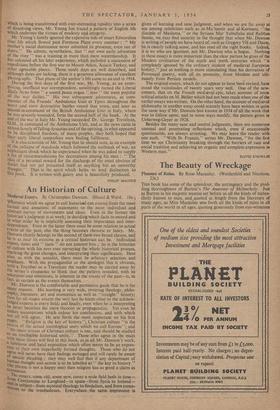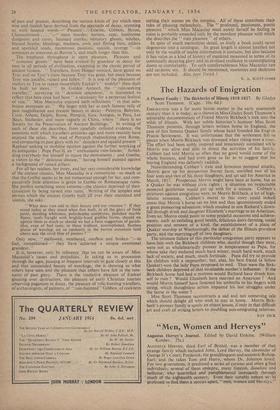The Beauty of Wreckage
THIS book has some of the splendour, the astringency and the plod- ding thoroughness of Burton's The Anatomy of Melancholy. Just as Burton in his majestic treatise set before us all the kinds of melan- choly known to man, and quoted at length from the literature of many ages, so Miss Macaulay sets forth all the kinds of ruins in all parts of the world in all ages, quoting generously from eye-witnesses
us with heaped. words—" Piranesi Goethe; Gibbon, Byron, Chateaubriand ...."—" mass murder, torture, rape, loathsome dungeons and caves, haunted castles, minatory ghosts, witches, blasted heaths, blindings, madness, owls and flitting bats, adders and speckled toads, monstrous passions, suicide, revenge "—in sentences as sonorous as Burton's, and much longer than this.
The t mphasis throughout is upon pleasure. Pleasure and " romantic gloom " have been evoked by grandeur in decay for men in all periods of civilisation, excepting in the classic period of ancient Greece. " Travellers, from Homer onward, have gazed on Troy and on Troy's ruins because Troy was great, but more because Troy was ancient, ruined and fallen." It is one of the pleasures of visitors to Tyre to repeat mournfully Ezekiel's " wishful thou shalt be built no more.' " In Golden Antioch the " ruin-seeking traveller," surveying its desolate splendour," is fascinated to reflect that here once had been " a sanctuary for a perpetual festival of vice." Miss Macaulay enjoyed such reflections " in that salu- brious mountain air." We linger with her at each famous relic of past magnificence and present beauty in decay—Palmyra, Babylon, Crete, Athens, Delphi, Rome, Pompaii, Goa, Antigua, in Peru, Les Baux, Silchester, and more vaguely in China, where " there is no Society for the Preservation of Ancient Buildings." In writing of each of these she describes, from carefully collated evidence, the emotions with which travellers centuries ago and more recently have enjoyed the relics. We read of Petrarch rhapsodizing over Rome, and comparing its past glory with its:' decadent and squalid present "; Raphael seeking to mobilise opinion against the further wrecking of its antiquities ; Pope Pius II, an " enthusiastic ruin-fancier," forbid- ding everybody but himself to injure the monuments ; and Goethe, a victim to the " delicious disease," having himSelf painted against a background of ruined pillars: For all her realism, her irony, and her very considerable knowledge of the ancient classics, Miss Macaulay is-a romanticist—so much so that the Gothic seems to be not romantical enough for her, and com- paratively little attention is given to Gothic or Romanesque ruins. She prefers something more extreme—the classics deprived of their classicism by being turned into ruins. Writing of the temples and shrines which the ancient Greeks built all over their mainland and islands, she asks :
" What does ruin add to their beauty and our emotion ? If they stood today as they stood when first built, in all the glory of fresh paint, dazzling whiteness, polychrome sculptures, polished marble floors, roofs fraught with brightly-hued godlike forms, should we aglmire them as much or should we feel a faint suggestion of garish- nZss, even of bad taste, in those brilliant, accomplished, flawless places of worship, set so opulently in the barren mountain land above seas the vivid blue of posters ? "
Only now, " mellowed, weathered, roofless and broken "—in -fact, romanticised—" they have achieved a unique emotional grandeur." It is, however, only by inference that we can be aware of Miss Macaulay's tastes and prejudices. In taking us in procession through the ages, pausing at frequent intervals to gaze closely at this and that unintended beauty of wreckage, she is showing us what others have seen and the pleasure that others have felt in the rem- nants of -past glory. There is the vindictive pleasure of Ezekiel gloating over destruction, the pleasure of early Christian tourists observing paganism in decay, the pleasure of relic-hunting travellers, of arclueologists, of painters, of "ruin-haunted" Gibbon, of cockneys
cutting their names on the temples. All of these contribute their tales of pleasing melancholy. The " profound, passionate, poetic pleasure " which Miss Macaulay must surely herself be feeling in ruins is probably exceeded only by the mordant pleasure with which she describes the " ruin pleasure " of others.
In spite of much meticulous detail, so lively a book could never degenerate into a catalogue. Its great length is almost justified not only by the wealth of usable information it contains, but also because it has value as a kind of history of mankind measured in terms of its continually decaying glory and its civilised resilience in contemplating doom'so comfortably. To such comfortableness Miss Macaulay can add sardonic wit. It should be .mentioned, mummies. and skeletons are not included. Alas, poor Yorick I
It. A. SCOTT-JAMES











































 Previous page
Previous page